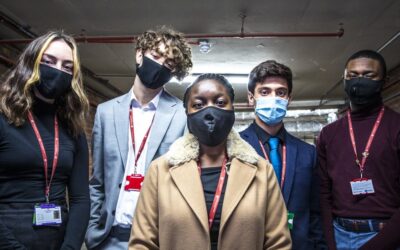image copyrightGetty ImagesGoogle, Facebook and Microsoft should be paying more corporation tax in developing nations, says ActionAid.The aid charity estimates that poorer countries are missing out on up to $2.8bn (£2.2bn) in tax revenue that could be used to tackle the pandemic.ActionAid is calling for big companies to pay a global minimum rate of tax.Facebook and Microsoft declined to comment while Google did not immediately respond to a request for comment.Multinational corporations are currently not required by law to publicly disclose how much tax they pay in some developing countries.According to ActionAid, “billions” might be at stake that could be used to transform underfunded health and education systems in some of the world’s poorest countries, especially since multiple tech giants have reported soaring revenues during the pandemic.US challenges ‘unfair’ tech taxes in the UK and EUFacebook agrees to pay France €106m in back taxesGoogle to pay €1bn to end French tax probeThe aid charity wants to see a new global tax system created, preferably by the United Nations, whereby large corporations are required to pay a global minimum rate of corporate tax reflective of their “real economic presence”. ActionAid estimates that $2.8bn could pay for 729,010 nurses, 770,649 midwives or 879,899 primary school teachers annually in 20 countries across Africa, Asia and South America.The aid charity said its research showed that the developing nations with the highest “tax gaps” from Google, Facebook and Microsoft are India, Indonesia, Brazil, Nigeria and Bangladesh.”Women and young people are paying the price for an outdated system that has allowed big tech companies, including giants like Facebook, Alphabet and Microsoft, to rack up huge profits during the pandemic, while contributing little or nothing towards public services in countries in the global south,” said David Archer, global taxation spokesperson for ActionAid International.”The $2.8bn tax gap is just the tip of the iceberg – this research covers only three tech giants. But alone, the money that Facebook, Alphabet (Google’s owner) and Microsoft would be paying under fairer tax rules could transform public services for millions of people”. Tax avoidance concernsThere have long been concerns that the biggest corporations do not pay enough tax in developed nations, and re-route profits through low-tax jurisdictions.Facebook, Google, Apple and Amazon have all settled disputes with French tax authorities over their operations in the country over the last decade. And the UK in April launched a new digital sales tax aimed at forcing tech giants to pay more on the income they generate inside the country. In February, Facebook boss Mark Zuckerberg said he recognised the public’s frustration over the amount of tax paid by firms like his. He added that Facebook accepted the fact it might have to pay more in Europe “under a new framework” in future, and backed plans by think tank the Organisation for Economic Co-operation and Development (OECD) to find a global solution.
BBC Business News Articles
Rolls-Royce: Barnoldswick workers to strike over Singapore jobs move
image copyrightPA MediaWorkers at two UK Rolls-Royce factories are to go on strike over plans to move some production to Singapore.The engineering giant announced plans to merge its plants in Barnoldswick, Lancashire, and cut 350 jobs in August.The Unite union said its members would go on strike for three weeks from 6 November and would not allow the firm to “destroy the viability of the site without a huge fight”.The company said its employees needed “to work with us, not against us”.In June, the engineering giant said it would be cutting 3,000 jobs across the UK as it tried to come to terms with the impact of the coronavirus pandemic.The firm later announced said it would stop making wide chord fan blades for new jet engines at its Bankfield site in Barnoldswick and move the work to Singapore by 2023.The move would also see its Ghyll Brow base incorporated into its Bankfield site.Unite regional officer Ross Quinn said the union had “given Rolls-Royce every opportunity to change its plans” and commit to the “long-term future” of the sites.”Barnoldswick is the cradle of the jet engine and the workforce and the local community will not allow Rolls-Royce to destroy the viability of the site without a huge fight,” he added.A Rolls-Royce spokesman said the firm was “disappointed to receive notice of industrial action… and remain committed to meaningful consultation”. He said the firm had “no plans” to close the factories, adding: “Our people in Barnoldswick will play an important role in developing fan blades for our future jet engines [and] we ask them to work with us, not against us as we deal with the impact of the pandemic.”image copyrightEmpicsWhy not follow BBC North West on Facebook, Twitter and Instagram? You can also send story ideas to [email protected]
Post Office says a third of its cash machines will close
image copyrightGetty ImagesThe Post Office is to cut a third of its cash machines in the next 18 months with 600 ATMs to be shut by March 2022.The move has raised concerns that rural and deprived communities face being cut off from access to cash.ATMs set for closure are little-used and have other free cash facilities close by, the Post Office said.It added that in areas where it is closing cash machines, customers can still withdraw cash over the counter free of charge.Martin Kearsley, banking director at the Post Office, said the business was keeping 60 non-commercially viable ATMs “to serve the community’s needs”.Currently the Post Office does not run any of the cash machines at its branches; they are operated by Bank of Ireland, which is pulling out of the business.That has prompted the review, which will mean closing 600 ATMs, while the Post Office has said it will spend £16m to maintain and upgrade other machines.Will we be getting our cash from shops, not ATMs?Could churches double up as bank branches in cash-stricken areas?It said by mid-2023 all ATMs it keeps will be replaced with new devices that have the latest cash dispensing technology and security measures. “This is one of the largest investment programmes in the free to use ATM market for over a decade,” said Mr Kearsley.The Post Office will also become a member of the Link ATM network.ATM usage slumpCash use has declined sharply during the coronavirus pandemic, with many businesses asking customers to pay by alternatives such as cards.Correspondingly the use of cash machines has slumped. In central London it has fallen by up to 80%, according to figures published by Link, the cash machine network.Across the UK, cash machine withdrawals between April and September fell by 48% compared to the same time last year.image copyrightGetty ImagesIn London and Westminster the number of withdrawals dropped 81%, while there were 71% fewer in Saffron Walden and Glasgow Central.”Every city, town and village has a different story,” said Link’s head of financial inclusion Nick Quin. “In places like city centres, it’s less busy overall, so there are fewer people using ATMs.”In some rural areas, though, there have been fewer tourists or perhaps the local shop, where the ATM is hosted, temporarily closed.”There are currently 42,000 free-to-use ATMs across the UK and 13,000 charging ATMs.In the early stages of the pandemic around 7,200 ATMs closed. These were mainly in premises that shut due to government restrictions, such as shops, airports, garden centres, pubs, or they were closed for social distancing purposes, such as at train stations and supermarkets. By the end of September more than half of them had reopened. Access to cash”What’s clear is that there are places around the country, where more people rely on cash,” said Link’s Nick Quin. “They’re often some of the most deprived places in the country. That’s important because while there are more people who prefer to use cards and shop online, there are a lot of people out there where digital payments still don’t work.”The Access to Cash Review revealed eight million people were at risk in the UK from the demise of cash.New trials planned for cash-stricken communitiesThe town with one cash machine for 8,000 people”Our research demonstrates that the majority of people are uncomfortable at the pace at which we are moving towards a cashless society,” said David Fagleman, from financial consultancy Enryo.”Not everyone is comfortable with making digital payments and we have to ensure that the rush to digitise does not leave people behind. Cash is still a very important payment method.”But going cashless also has benefits, said Amy Gavin from fintech consultancy 11:FS. “Electronic payments are faster, some feel safer not carrying cash around, and electronic payments can also help consumers with budgeting.”However, she added: “It remains true that a reduction in cash use in society disproportionately negatively impacts its most vulnerable segments – such as older people and those with very low incomes who use cash to manage their budgets.”The government has proposed to legislate to protect cash and one option is for cashback to become more widely available in shops.
Hopes of shake-up at Samsung after death of chairman
image copyrightReutersSpeculation is mounting that Samsung could be shaken up after the death of chairman Lee Kun-hee. Shares in several Samsung businesses rose amid reports that his heirs could be forced into asset sales or dividend payments in order to pay a massive inheritance tax bill.Mr Lee, who helped to build Samsung into Korea’s largest conglomerate, died over the weekend aged 78. Analysts say his heirs face billions in taxes from his share assets alone. That includes his scandal-struck 52-year-old son, Lee Jae-yong, who has managed the sprawling South Korean technology group since 2014. Lee Jae-yong has twice been accused of fraud over his role in a 2015 merger deal at the tech giant and is currently awaiting trial. At 50%, Korea’s inheritance tax rate is one of the world’s highest. A premium can be added to shares if the deceased has a controlling interest in a company, potentially taking the top rate to around 60%. By comparison, inheritances are taxed at 40% in the UK, and although the top rate is similar in the US, the minimum threshold is set so high that few Americans actually pay it. Samsung Group titan Lee Kun-hee dies aged 78Lee Jae-yong: Samsung heir faces fresh charges over 2015 mergerMr Lee was the richest person in South Korea, according to Forbes, with a net worth of nearly $21bn (£16bn). He took over Samsung in 1987, and introduced radical measures which helped propel the company from a second-tier electronics manufacturer to an international tech giant. He owned major stakes in the conglomerate’s crown jewel Samsung electronics, as well as the holding company Samsung C&T, Samsung Life Insurance and Samsung SDS. ‘Outrageous’ tax Mr Lee is survived by his wife, Hong Ra-hee, his son Lee Jae-yong and his two daughters, Lee Boo-jin and Lee Seo-hyun. Each is already a billionaire in their own right, according to Forbes. “The inheritance tax is outrageous, so family members might have no choice but to sell stakes in some non-core firms,” NH Investment Securities analyst Kim Dong-yang told Reuters.Any shake-up of the conglomerate, however, could depend on what the firm’s de facto boss Lee Jae-yong chooses to do. Alternatively, Samsung’s affiliates might also pay higher dividends, leaving more money for the younger generation of Lees to pay the bill. Speculation over the future of Samsung following Mr Lee’s death has stirred investor interest over various units of the conglomerate. On Monday, shares in Samsung C & T surged by 21.2%, while Samsung Life Insurance rose 15.7%.Shares in Samsung Biologics, Samsung SDS and Samsung Engineering also tracked higher.
The explosive problem of 'zombie' batteries
The stress levels rocketed for Ian Scott-Browne earlier this month, when one of his colleagues radioed him and told him to call the fire brigade. Smoke had been spotted coming from one of the sorting machines at the Smallmead recycling centre, just outside Reading in southern England.He knew that a fire in one of the machines could be catastrophic as burning plastic, paper and cardboard could be quickly spread by conveyor belts which connect all the machines in the facility.”My concern was that we’d lost control of where the fire was,” says Mr Scott-Browne, who is an operations manager at the recycling facility.For him there was a tense 15 minutes while firefighters, helped by some of his staff, urgently took heavy metal panels off the side of the sorting machines to track down and extinguish the fire.Small fires like that are surprisingly common at recycling centres. Somewhere in the UK there is one every day, on average.As a result the industry has become good at extinguishing them, but they would rather not deal with them at all, particularly as recycling centres are full of combustible materials.The problem is that however attentive staff might be to the threat of fire, they can’t control what people put in their recycling bins.The Environmental Services Association (ESA), which represents waste firms like Biffa, Veolia and Suez, says too many batteries are going into either recycling bins or black rubbish bags, where they are easily damaged by sorting equipment and start to burn – so-called “zombie” batteries.The ESA has launched a campaign called Take Charge which encourages people to dispose of batteries properly.”Unfortunately, the majority of batteries thrown away in the UK at the moment are not put in the proper recycling bins. Fires caused by carelessly discarded zombie batteries endanger lives, cause millions of pounds of damage and disrupt waste services,” says Jacob Hayler, executive director of ESA.More Technology of BusinessThe apps promising to improve your sex lifeThe forklift truck drivers that never leave their desksNew jets promise to revive supersonic travelCreating fuel from thin air with artificial leavesCar makers compete to keep you entertainedLithium-ion batteries, which power mobile phones, tablets and toothbrushes, can be extremely volatile if damaged. CCTV footage taken at several recycling centres shows explosions sending flames and debris shooting across sorting areas. And those sorts of batteries are a growing menace. Between April 2019 and March 2020, lithium-ion batteries were suspected to have caused around 250 fires at waste facilities. That is 38% of all fires, up from 25% compared to the previous year, according to the latest data from ESA.In many cases the precise cause of a fire is never established but ESA says it is likely that lithium-ion batteries account for an even bigger proportion of fires.Paul Christensen, professor of pure and applied electrochemistry at the University of Newcastle, has deliberately damaged lithium-ion batteries in experiments to make them explode.The experiments are part of his work to help fire brigades tackle fires involving lithium-ion batteries.Prof Christensen is a “massive fan” of the batteries and points out that they are perfectly stable under normal conditions.However, he says that even small lithium-ion batteries, similar to the ones in your mobile phone, would explode “with a rocket flame” if punctured. His real concern though is with the much bigger batteries found in electric cars, or used to store electricity in homes and businesses.image copyrightGetty ImagesThey are generally divided into many small cells and managed by software that keeps the battery running smoothly. But if a car crashes and some of those cells are damaged, the chemicals inside can generate huge of amounts of heat, damaging and igniting other cells.”An electric vehicle will burn for much longer than an internal combustion vehicle. They give off potentially explosive and toxic fumes. They can reignite hours, days or weeks after the incident,” says Prof Christensen.Electric cars are still relatively rare on the roads, but that will change in the coming years. In February the UK government brought forward a ban on selling new petrol, diesel or hybrid cars from 2040 to 2035 at the latest. Governments elsewhere in the world are also encouraging electric car sales – in China the government wants 25% of new cars sold to be electrified by 2025.”That means not just more electric vehicles, but the production facilities will get more and bigger… the storage facilities are going to get more and bigger,” Prof Christensen says.He wants planning and safety regulations to take account of the risks of having so many more powerful batteries. He also wants better training for firefighters.Eurobat represents European Automotive and Industrial Battery Manufacturers. It says safety is always “high on the agenda”, and is supporting a colour-coding system for batteries that would make sorting them easier.In the meantime the UK waste industry just wants people to be more careful when disposing of any battery.”We urge consumers to please recycle their batteries responsibly by using battery recycling points in shops and recycling centres, or a separate battery kerbside collection if available,” ESA’s Jacob Hayler says.Follow Technology of Business editor Ben Morris on Twitter
Boots to offer 12-minute Covid nasal swab test
image copyrightMATTHEW HOWELLA Covid test that can provide a result in 12 minutes will be made available at high street pharmacy Boots.The nasal swab test, which will cost £120, will be available in more than 50 stores across the UK to anyone who is not showing symptoms.The test, and the device needed to process it, have been approved by authorities in Europe and the US.In trials on more than 500 patients it accurately detected the virus in more than 97% of cases.How to get a Covid testNHS Scotland to get 12-minute Covid test kitQuarantine for Covid contacts could be reducedThe technology has been developed by UK-based life sciences company LumiraDx, which has also struck a deal to provide supplies to the NHS in Scotland.The test, which detects the presence of a Covid-19 antigen protein, is said to be considerably faster than other rapid tests currently being trialled, which produce results in an average time of 90 minutes.The service is available as a private pre-flight testing service for customers who require a test before travelling abroad. It is also available for people seeking peace of mind before seeing friends and family.Depending on demand and feedback, the launch may extend to 200 stores over the coming months.The equipment connects to a cloud system, which could potentially allow for speedy tracking of disease outbreaks by health authorities.Target missedSpeedy and comprehensive testing is thought vital to efforts to contain the second wave of the virus while the world waits for an effective vaccine.But figures released last week showed that just 15.1% of people are currently receiving results within 24 hours through the official system in place in the UK.THREE TIERS: How will the system work?SOCIAL DISTANCING: Can I give my friends a hug?PAY-PACKET SUPPORT: What will I be paid under the new scheme?SUPPORT BUBBLES: What are they and who can be in yours?FACE MASKS: When do I need to wear one?Sir Patrick Vallance, the government’s chief scientific adviser admitted there was “room for improvement” in the NHS Test and Trace system.Boris Johnson previously pledged that all tests would be processed within 24 hours – unless there were issues with postal tests – by the end of June.Research suggests that on average people develop symptoms of Covid 5.1 days after they were infected. While a small proportion develop symptoms within three days, others may take nearly two weeks to become ill.COVID REINFECTION: The Naked Scientists ask – can you catch Covid twice? FANCY SOME ESCAPISM?: Watch brand new drama Roadkill, a political thriller staring Hugh Laurie
'Generation Covid' hit hard by the pandemic, research reveals
Young people, particularly those from deprived backgrounds, have had their earnings and job prospects hit hardest by the coronavirus pandemic, adding to fears for the long-term impact on their futures.BBC Panorama found people aged 16-25 were more than twice as likely as older workers to have lost their job, while six in 10 saw their earnings fall, according to new research.It also highlighted the impact of school closures on young people and added to growing evidence that students from poorer backgrounds have fallen behind their more privileged peers. A quarter of pupils – some 2.5 million children – had no schooling or tutoring during lockdown, the survey by the London School of Economics (LSE) suggests.But, the study adds, nearly three quarters of private school pupils had full days of teaching (74%) – almost twice the proportion of state school pupils (38%).Lockdown had ‘major impact’ on mental health’This pandemic has left me with nothing job wise’Young people ‘most likely to lose job’ in lockdownThe study’s authors warn it could lead to poorer pupils suffering “permanent ‘educational scarring'” when it comes to key academic milestones such as exams and securing a university place. ‘Lockdown did so much damage’Sixteen-year-old Roberta, who was working towards her GCSEs when lockdown came, says she did not get the “closure” of taking her exams and got no education or support from her school in the six months of lockdown.In September, she started at a new, highly competitive school in London – the Harris Westminster sixth form – which aims to provide a “life-changing education” for bright but disadvantaged students. “That break of six months did so much damage,” she says. “Usually I’d be able to be sitting for hours and be able to revise and really absorb it in my mind. “Now I get kind of restless after one or two hours.”Out of the 325 students in Roberta’s year group, a third are from deprived backgrounds and 20 were previously privately educated.Although Roberta is now back in the classroom and adapting to life in Year 12, she says it has been “stressful” trying to keep up with her peers from privately educated backgrounds.”I think coming into this school, I didn’t realise the disparity would be this big in the classroom. There are people that don’t know anything and people that know almost the whole content. “You can tell who will do well in their A-levels, and who isn’t. And where will I be?”And even though schools like Roberta’s are doing their best to make sure their students don’t miss out, four in 10 pupils across the UK are still not getting the same number of teaching hours as they did before lockdown.’This traineeship is worth everything’Rasheed Graham from north-west London also feels his future is now hanging in the balance due to Covid-19.The 23-year-old had secured a place on a fully-funded pilot’s training course, before the coronavirus outbreak brought it to a halt.Rasheed was told the flying school was closing and the airline could not afford to fund the training anymore.In order to continue, he needs to find £60,000 to cover the costs.”This is why the cadetship is worth its weight in gold, because if you don’t come from wealth or money, it gives you the opportunity to pursue a career as a pilot if you didn’t have the means before,” he told Panorama.Rasheed is trying to crowd fund the money to pay for his course and has raised almost £22,000 so far.”This could work out or it couldn’t. I’ve actually accepted both eventualities,” he says. “But I’d rather look back and realise that I’d tried to do something to return to flight training than sit back, and let the opportunity go by.”‘Massive increase in anxiety’Unsurprisingly, the upheaval and uncertainty created by the pandemic has also taken a toll on young people’s mental health.Research conducted by the Samaritans and the University of Glasgow found young adults (18-29 years) were more likely to report depressive symptoms and suicidal thoughts than older people.Kiylee White-Lee, assistant principal at Harris Westminster sixth form told Panorama: “We’ve seen a massive increase in students with anxiety and not just anxiety about the future, but having things like sensory overload of being back in a situation where you’re surrounded by people. “We’ve seen a big increase in students with eating disorders this year. And increase in depression as well. So, we’ve had to, where possible, direct them to the nursing and the counselling, but within the first two weeks, those two things were completely saturated, pretty much,” she said.”Schools will still go on educating young people. That’s what we’re here to do but we’re not in the bedroom with them, checking in on them, checking that they’re okay, checking that there’s somebody at home looking after them. “It’s hard to switch off from that. How do you switch off from worrying about 600 students that you know need you?”The Department for Education said it is giving every school more money and has provided £58m to help schools with the extra costs of Covid while the Department for Work and Pensions said its plan for jobs focuses on supporting people in need. It includes the Kickstart scheme, offering the minimum wage for six months work experience, and an investment in apprenticeships, traineeships and work coaches.With coronavirus cases rising and London now under England’s “high” tier two restrictions, Roberta’s future feels even more uncertain – but she is still hopeful. “I don’t know how the future’s going to pan out but perhaps society can come out better than we were before,” she says.Watch BBC Panorama: Has Covid Stolen My Future? on Monday 26 October on BBC One at 19:30 GMT or afterwards on the BBC iPlayer.
My Money: 'We haven't got Covid here yet'
image copyrightSian WilliamsMy Money is a series looking at how people spend their money – and the sometimes tough decisions they have to make. Here, Sian Williams from Gili Trawangan, a tiny island in Indonesia, takes us through a week in her life during the coronavirus pandemic.Sian has lived on Gili Trawangan for the last eight years. Luckily, the island is still Covid-free because inhabitants were on a strict four-month lockdown where no one was allowed to enter or leave (and return), reducing the risk of cases. Sian works full-time for an environmental conservation NGO, the Gili Eco Trust. She says there has been a strange transition from working on one of Indonesia’s busiest holiday destinations to now what is a dead island. With no tourism there are no jobs. And with a very uncertain future, she is just trying to spend as little as possible and is continuing to clean the island, working in waste management, sustainability and tree planting projects.Sian’s salary has been halved, to around £400 a month, and it doesn’t cover living expenses, but her rent is paid until February and she is able to use her savings.She hasn’t considered returning to the UK yet as she is one of only two people working for the NGO.With such a small community, she says they are very lucky that social distancing comes all too naturally, gatherings are small and end early. They have cancelled the weekly beach cleans of around 60 people a week, and have switched to solo clean-ups and tagging marine debris on social media to continue to keep the island clean and to stay positive for a quick return of tourism and the economy.Over to Sian…We have just returned from our third trip off Gili Trawangan since lockdown began in March. An unexpected getaway weekend to Lombok organised by my boyfriend. We checked out at 11:00 after a beachside breakfast, a few laps of the pool and a mini beach clean. We paid for our slightly over-indulgent bar bill (and a cheeky massage) with my share being 2,287,500Rp. The resort had a private beach, infinity pool and amazing local cuisine. Such a treat!image copyrightSian WilliamsOn the way back to the island, stopped for provisions in Mataram city. After eight years in Asia (and being shamed by the Uncle Roger YouTube sensation) I finally bought myself a rice cooker 299,000Rp. Along with picking up some special cat food for one of my five cats that has an autoimmune disease. 100,000Rp for around a week of food. Found some accessories for a silver-themed costume birthday party at the end of the week and a pair of trainer socks (cos they had cats on them!) 91,000Rp and the rest of the costume will have to be made at home.image copyrightSian WilliamsWe were wiped out by the time we got back to the island, an ill-prepared monsoon rainfall meant we were pretty soggy and unmotivated to cook, so we ordered in our favourite plastic-free takeaway from Jali. Mains and a side were 88,000Rp.Total spend: 2,865,500Rp (£149.50)My MoneyMore blogs from the BBC’s My Money Series:UK: ‘Most of our spending is on our son’Sweden: ‘My house looks happy’US: ‘Our alternative quarantine holiday’Canada: ‘With love on my side, I can get through today’We’re looking for more people to share what they spend their money on. If you’re interested, please email [email protected] or get in touch via our My Money (World) Facebook group, or if you live in the UK, please join our My Money (UK) Facebook group and we’ll aim to contact you.After a brekkie of tofu scramble, I made a to-do list catch up from the weekend away and set off for my four-minute bicycle commute to the eco-shop I open once a week for eco-friendly supplies and zero-waste kitchen hacks for islanders – and the island’s most extensive book swap shop. image copyrightSian WilliamsAfter feeding six out of 10 regular stray cats that are suffering and hungry from the lack of tourism, the shop was swept, cleaned and ready to open. I was quickly distracted, rooting through our donated clothes store finding a second-hand silver(ish) playsuit and pair of boardies (shorts). Costume for Friday is coming together! Two items in our pre-loved charity shop come to 100,000Rp.At 15:00, closed the shop up, fed the cats for the last time and headed to meet a friend at Trawangan Dive for a cool off in the pool. We caught up over a fresh watermelon juice, which Charlie claimed to be the best on the island (he wasn’t wrong!). In exchange for a bunch of new movies and docus, two watermelon juices came to 70,000Rp.image copyrightSian WilliamsThis evening is our monthly book club meetup! Which has, over the years evolved into a wine appreciation evening and girly catch up. Hosted by Catherine, who fortunately also owns a Polynesian bar, Tiki Grove. For the first time in six months, we had Taco Tuesday! Even better in our own private closed down bar! Shared a bottle of wine and had an early night, so I didn’t spend anything this evening.Total spend: 170,000Rp (£8.90)Up early at 05:00 to film the sunrise. I’m making a blog for the Headspace app about the turtle conservation that I run and it will be a one-off payment. Beautiful start to the morning and literally SO excited to be featured in my favourite app! image copyrightSian WilliamsFollowed by a quick HIIT workout in GiliFit and heading to my manager’s place to work on some grant applications for our NGO, which currently has no funding. Tourism is the only industry on Gili T, and the Gili Eco Trust runs completely on donations. We have to act fast to find other sources of income, and are teaching ourselves to search for, and apply to as many grants as we can to keep our charity alive.A quick stop at the island dump to get some footage of Indonesia’s plastic waste problem. It is being highlighted next week by WWF in Norway. The dump is the reason why I started to live low-waste. To create rubbish and know where it ends up, is wrong on so many levels. Now we have a small under-counter kitchen bin which we empty every three to four months.image copyrightSian WilliamsWednesday is Pituq weekly veg box pick up day. Pituq Community Foundation started a “shop and drop” when we got locked down on the island as they operate on mainland Lombok. The profits of our package and plastic-free veggies go to feeding families suffering unemployment from the Covid crisis, so I see buying more plastic-free veggies as a donation to Lombok too.This week came to 214,000Rp for the week’s food for me and my boyfriend. So we pay half each of this plus delivery – or 107,000Rp. Cheap and lazy evening, spaghetti and homemade vegan pesto and a movie.Total spend: 107,000Rp (£5.60)Today is my Mum’s 60th birthday. Really gutted as I was meant to be at home in England right now celebrating it with her, but travel is so unsafe and I don’t fancy spending half of my allotted home-time in quarantine, (regardless of the lax rules in the UK right now!) so her 60th birthday will now be rescheduled to next year. Sorry, Mum!The whole island was awake to a 04:00 power cut. Luckily, early enough to wake up to check out the sunrise again. Once again, it didn’t disappoint! image copyrightSian WilliamsZoom yoga is FREE today! Denise, my instructor, set up a 10-class islander pass (450,000rp). Covid times are biting down hard but this community is so supportive trying to keep options open for everyone to stay sane whilst we are not working. We went to Banyan Tree for kombucha and to join all the digital nomads that were hunting for a wifi connection and battery point, and ended up buying some cakes for my friend too. The total for a kombucha and three cakes was 122,000Rp.Off for a quick haircut in the jungle garden of Pip. She gives an island price for an international standard haircut (and loved her cake!) and a chance for some gossip, a quick catch up and some donated pressies of tea, oats and bananas before she heads to England in search of a job. It’s so sad that everyone is slowly leaving our island empty and deserted. One mop management job later, 300,000Rp. image copyrightSian WilliamsGave up on cooking dinner and Fabien ordered us pizza. My vegan pizza was 90,000Rp. Mid pizza, POOF another power cut. With the evenings not cooling past 29’C, we begrudgingly accepted that we couldn’t not sleep another night and headed to Manta Dive for a date with the generator. Fab paid 200,000Rp for a room. Total spend: 512,000Rp (£26.70)Regular Debris Free Friday with the Gili Eco Trust isn’t on today, so when I woke up, I stopped past the beach for a two-minute beach clean and then prepared for a Zoom interview about our turtle conservation. It finished in time to head to GiliFit for a quick workout before going to buy some eggs for breakfast. A tray of 30 eggs (50,000Rp) a box of matches (10,000Rp) and a bag of oregano (25,000Rp) later, I ate and sat down to some work emails.image copyrightSian WilliamsWe left for Clive’s silver party at 16:00. Two bottles of silver spray paint later and my previous 1920s costume had a millennium spacey look. A DJ from Bali came especially, so I danced especially hard and together with Fab we racked up a bill of 1,120,000Rp. Just couldn’t get enough of those Ginger Sailor cocktails! We paid half each and somehow cycled home.Total spend: 605,000Rp (£31.50)image copyrightSian WilliamsI will never learn to control how much I drink and today’s hangover confirmed I had way too much fun last night. I ordered a vegan bagel from Kayu Café which took around three hours to eat, whilst binge-watching Suits. With only enough energy to stare at the garden (things that are alive and thriving make me feel better when I’m suffering a painful death) and to cook an evening meal, I decided upon my childhood ultimate favourite comfort food. My Mum’s tuna pasta bake. Since tuna is extremely unsustainable to eat nowadays, and that I follow a strict low FODMAP (fermentable oligo-, di-, mono-saccharides and polyols), dairy-free veggie diet, I made the whole thing from scratch and successfully used every item of the kitchen (it’s Fab’s job to eat the food, and clean up after me ha!) First time I’ve made this and it won’t be the last! Over half the tray left for lunch tomorrow.Total spend: 150,000Rp on a takeaway brunch for two (£7.80) Sian WilliamsSian’s Vegan Tuna Bake1 can chickpeas, 2 tbsp lemon juice, ¼ chopped Nori sheet, fresh dill, 1 tbsp mustard,1 tbsp miso paste, 1 tbsp chia seed & 1 tbsp capers.
Smash it all up in a bowl and voila!£5.90for six portions (serve with pasta, tomato sauce, cheese sauce and veggies)Source: Sian WilliamsI swear hangovers were invented to make you REALLY appreciate life after they have gone. A solid nine hours of sleep and a coffee on the porch in the sun and I’m ready for the day. Spent the morning in the dump next to my house, scavenging an old scaffold tower and some bamboo poles to make a bean trellis for the garden. After a few repairs I’ve managed to turn the scaffold step into a set of shelves to put seedlings on where the cats can’t get to them (or can they?… challenge accepted) and re-potted some loofah vines, beans, edamame and harvested one very small passionfruit. Gardening has been a time-consuming learning curve, I haven’t inherited my Dad’s horticultural skills! But seeds and cuttings are all propagated from around the island or the rainforest in Lombok which has made it a fun, relaxing and mindful activity throughout the lockdown. My other favourite Sunday activity is making a roast dinner. Fab converted the spare room into a kitchen for my birthday when we moved in, I love it! We had crispy roast potatoes, baked sage tofu, Mediterranean veggies and marmite gravy.Total spend: £0image copyrightSian WilliamsTotal spent this week: 4,409,500Rp (£230)How does Sian feel about her week? The splurge at the beginning of the week made up most of this pretty expensive week. We go to the mainland so rarely that I tend to panic buy provisions (especially now there is a shop with imported foods). I also know as soon as I have a bar tab, I am slightly more frivolous with my spending than paying cash. Made all the more painful as I don’t remember paying it (thanks to strong cocktails and Fabien for looking after me!) Even after eight years of living in Indonesia, the exchange rate still shocks me. On paper, £230 seems ok for a week’s spending! But sadly due to Covid, my monthly salary is only around double this.Tips for savingOrganize your day and plan what you need to reduce take-outs and plastic waste (coffee, lunch box, travel utensils, water).My biggest tip for saving the pennies (and rupiah) is cooking everything from scratch. It’s time-consuming cooking three meals a day, but right now time is what we have plenty of.The cost of living of course, is a lot cheaper in Indonesia, but being a Muslim country with very strict alcohol policies, drinking heavily adds onto any weekly bill. If I could manage a month free of booze, it would surely help. Unfortunately, I am more than good at keeping my international cliché of being a boozy Brit…image copyrightSian Williams
BHS collapse: 'I was in charge of millions, then I had nothing'
image copyrightSantosh KumariWhen then fashion buyer Santosh Kumari was called into the canteen at the offices of BHS more than four years ago to be told she and her colleagues would lose their jobs, the announcement followed plenty of warning signs.For months before, Santosh says that stock had to be marked down as suppliers hounded the company for payments, later turning down orders because their banks feared that the retailer wouldn’t pay up.”It was really bizarre because we were all looking for jobs,” she says. “My assistants and I were talking about jobs, where normally you don’t talk to your line manager about going for another job elsewhere.”When the end came, the business was so bereft of resources that she and other staff were told they would not receive redundancy pay beyond the statutory minimum. “One day I was flying around the world and in charge of millions of pounds in my department, and the next minute, I have nothing and I’m worried about paying my mortgage.”Why are accountants getting their sums wrong?Are UK companies strong enough for coronavirus?Are Britain’s banks strong enough for coronavirus?BHS’s collapse and the subsequent demise of firms such as Carillion and Thomas Cook have had a common thread in that the outside accountants hired to check their finances have been criticised.image copyrightGetty ImagesBHS’s auditors, PwC, were fined a record £6.5m after signing off accounts the industry watchdog, the Financial Reporting Council (FRC), called “incomplete, inaccurate and misleading” in its report into the aftermath of the collapse. According to the FRC’s most recent analysis, a third of UK audits are substandard.Parliament has been scrutinising the audit industry for some time.In 2011, a report from the House of Lords said: “The audit of large firms, in the UK and internationally, is dominated by an oligopoly with all the dangers that go with that.”It recommended companies should tender for audit work every five years, and it said that “complacency of bank auditors was a significant contributory factor” to the 2007-08 financial crisis.image copyrightGetty ImagesSince 2018, three government-commissioned reports have been published about audit reform.The Kingman review has suggested replacing the current regulator with a stronger one, the Brydon review said auditors should try harder to detect fraud, while one conducted by the competition watchdog, the Competition and Markets Authority, said auditing and consultancy needed to be separate businesses.Despite all these failings and recommendations, no laws have passed to tighten the rules.The government insists it knows that reform is needed and has said it “will respond with comprehensive proposals for reform and will then bring forward legislation as soon as parliamentary time allows”.But over the summer the government was criticised by parliament for dragging its feet. A different approach is suggested by Prem Sikka, a recent entrant into the House of Lords as a Labour peer and a professor in accounting.”I don’t think it can really be fixed,” he says. “As long as accountancy firms are paid by the companies they audit, and they also then throw in a bit of a consultancy, there is a conflict of interest. Nobody’s going to bite the hand that feeds them.”He says that the best solution would be to have a state body audit the largest companies, just as HMRC oversees the auditing of tax collection. “I think it matters, because we rely upon auditors to make corporations publicly accountable. And that matters, not only to investors in the stock market, but also to employees, about the safety of their pension schemes and to creditors.”He says the public should have access to basic facts about audits such as the size of the audit team, its contract, hourly rates and how long is spent on the work.image copyrightGetty ImagesWhile no rules have been changed, not everyone has failed to act.In the wake of its $1.9bn settlement with US authorities in 2012 over anti money-laundering concerns, global banking giant HSBC hired more internal auditors and compliance workers and set up more rigorous systems.Part of its plan included hiring consultants with the goal of encouraging a more inquisitive culture at the bank. Employees at the bank were encouraged to ask questions about where money was being made and how.One of those hired to do the training was Ian Hynes, a former police officer and investigator and now chief executive of training firm Intersol Global, which has trained internal auditors in the art of conducting an effective investigation. He says while HSBC’s decision to train bankers to do this seems perfectly natural and should be replicated by other businesses, it is hardly the norm among big companies.”Where we delivered training, a very common theme in the feedback was that they were disappointed that they did not receive the training at the outset of their careers, whatever that career was, whether it was audit or compliance,” he says.image copyrightIntersol GlobalIt’s even less the norm among the largest auditors, he says, who have shunned his investigative training.”It’s been hard work,” he says. “We’ve had little reaction, if any.”A questioning mindset could have stopped many a scandal, he says. Auditing “should be seen as an asset that’s valuable, that adds value to the business that helps secure, protect reputations, lives, careers, save the entities’ money”.His business as a trainer in these skills “has been termed the ambulance at the bottom of the cliff, and it frustrates the life out of me that we ended up getting commissioned when the damage is being done.”Ms Kumari and some former BHS colleagues sued the defunct company’s estate and won after a court found it had broken the law in not providing sufficient consultation over job losses.”The speed of BHS’s collapse into administration and the announcement of redundancies shortly thereafter left many employees suddenly and unexpectedly out of work,” said her lawyer Carl Moran of SDM Legal.Ms Kumari, like many others looking for work in the wake of corporate failure, says the blame of the collapse of BHS should lie with its bosses. But she wonders what auditors knew – or could have asked – about the company’s books before the end.
Coronavirus: Local lockdowns 'stifling jobs recovery'
image copyrightGetty ImagesDeserted High Streets are stifling the British job market’s recovery, new research suggests. Urban areas in Scotland and southern England have seen the biggest declines in job postings, according to the Centre for Cities think tank.Vacancies have failed to return to pre-pandemic levels across all 63 towns and cities it analysed across the UK.The slow jobs recovery is linked to a “collapse” in the number of jobs in services being advertised, it says.Aberdeen, where the oil industry has struggled during the pandemic, recorded the steepest fall, with a 75% decline in job vacancies at the beginning of October, compared to the same time last year.It is followed by Edinburgh at 57%, and both Belfast and Crawley, a West Sussex town near Gatwick Airport, at 55%.London has seen the sixth biggest fall in job postings at 52%. Overall, UK vacancies are 46% behind last year’s level, said the report from the think tank and jobs website Indeed.Andrew Carter, chief executive of Centre for Cities, said: “This could have potentially catastrophic long-term consequences for people and the economy.”The government has told us to expect a tough winter and while local lockdowns are necessary to protect lives, it is vital that ministers continue to listen and reassess the level of support given to help people and places to cope with the months ahead.”‘Long winter’ for unemployedThe think tank’s analysts said in general, the lag in hiring was concentrated in sectors exposed to Covid-19 restrictions, such as retail, arts and leisure. Stricter coronavirus rules are now in force for nearly six million Britons.They also said working from home was stifling industries which depended on High Street footfall.Areas where footfall has returned to normal more quickly, such as Birkenhead, Chatham and Hull, have seen a faster recovery in the number of jobs advertised.Pawel Adrjan, UK economist at Indeed, said: “The timid recovery in job vacancies is a portent of the distress towns and cities could face if restrictions continue to spring up in parts of the country already reeling from imposed lockdowns and reduced footfall.”How many people are out of work?How to get a job: Top bosses share their secrets’I didn’t want to tell anyone I was claiming benefits'”With the remote work trend showing no sign of abating, and entire regions being placed under stricter control, service jobs in large towns and cities could become scarcer still and pull the UK into a jobs spiral,” Mr Adrjan said.”That could mean a very long winter ahead for the millions of people currently unemployed,” he added.The UK unemployment rate stood at 4.5% in the three months to August – the highest level seen in over three years.According to the Office for National Statistics, an estimated 1.5 million people were out of work and job hunting between June and August.A spokesperson for the Treasury said it had put in place a comprehensive plan to protect and create jobs in every region of the UK, and increased the generosity of its winter support schemes.”We are also providing additional funding for local authorities and devolved administrations to support local businesses,” they added.










